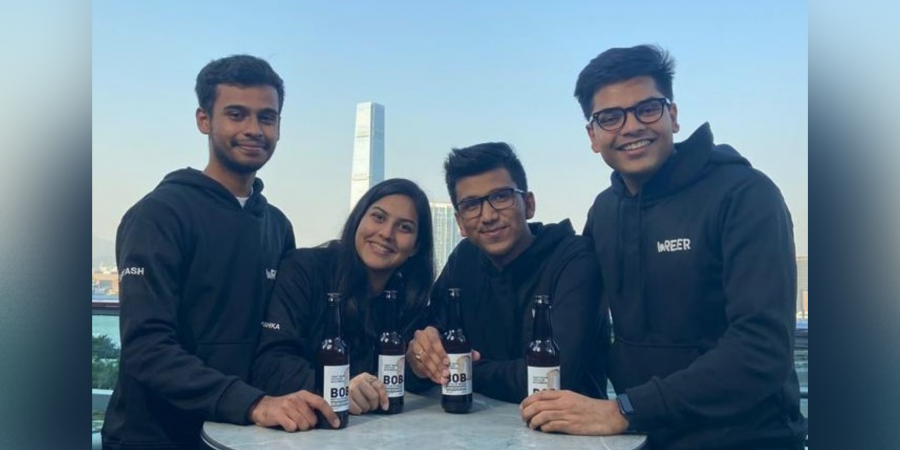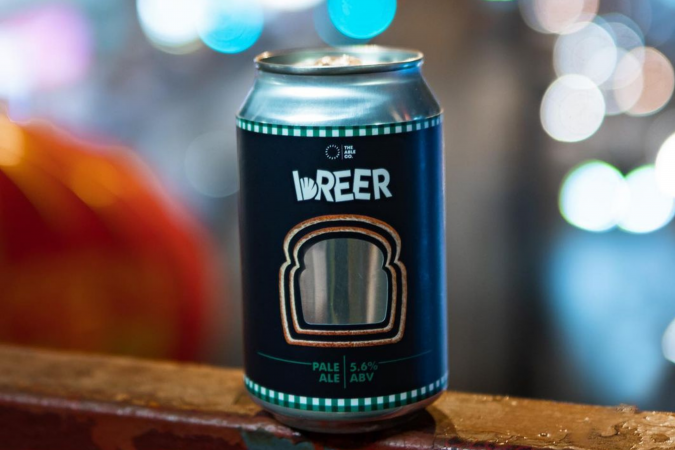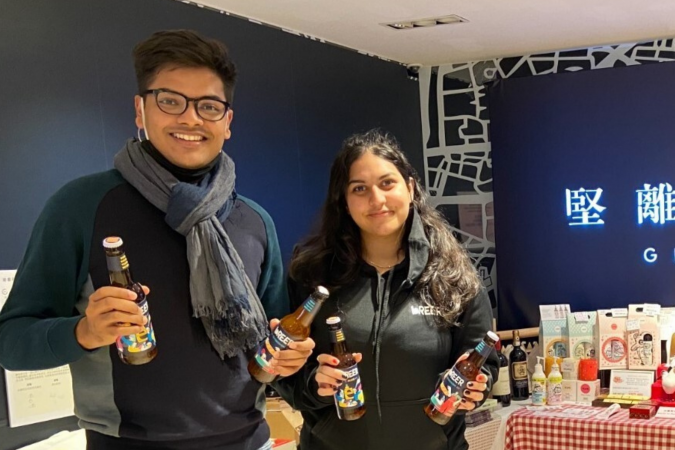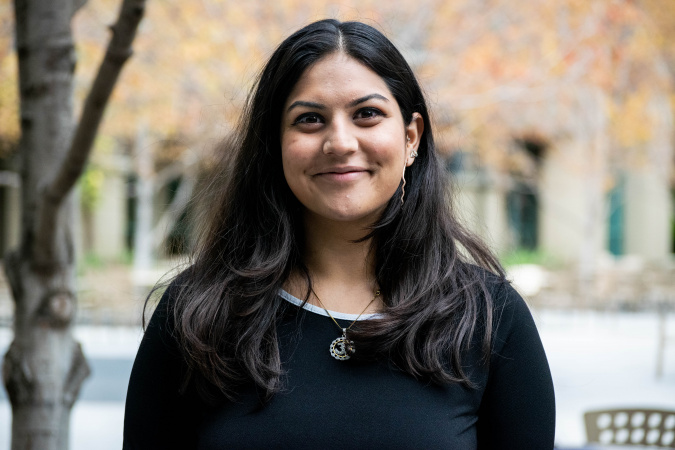Food Upcycling Start-Up Turns Leftover Bread into Beer
Having lived in Hong Kong since she moved here while still a child, Anushka PUROHIT has been passionately interested in conserving the environment since her 10th birthday.
“To celebrate, my parents brought me to a chain café for the first time,” recalls Anushka of her ‘lightbulb moment’. “As we were waiting for our frappes to be made, I couldn’t believe it when I saw a barista dumping piles of unsold but edible sandwiches into a bin. If this was what happened in just one minute of one day at one of Hong Kong’s thousands of restaurants, how much more food was being wasted territory wide?”
From awakening to action
Anushka’s youthful awakening inspired her to begin investigating environmental issues and ways she could transform her idealism into practical actions. In 2019, the second-year engineering student joined forces with three fellow HKUST undergraduates and co-founded a sustainable food upcycling start-up called Breer.
“The food waste issue hit home again when my friends and I saw bakery staff dumping dozens of unused loaves of bread. Feeling we must do something, we started researching. When we learned that bread and beer both used the same key ingredients, we all thought ‘wouldn’t it be cool to try and brew beer from waste bread’,” says Anushka.
Popular beers contain an average of 78% malted barley, the same ingredient used to make bread. By replacing all that barley with leftover bread, brewers could slash their brewing costs.
Excited by the prospect of testing their ingenious idea, the team began asking local bakeries to start donating rather than simply discarding their waste bread. Anushka admits that it was initially quite challenging to persuade others to believe in their vision. Language also proved problematic.
“While I can speak Cantonese quite well, I was very shy. To get our company up and running, I needed to step outside of my comfort zone and win businesses over to our way of thinking. Interestingly, the more confident I became, the more my Cantonese improved,” says Anushka.
Early success with lager and pale ale
Backed by the networking support and guidance of HKUST’s Entrepreneurship Center (EC), the Breer team studied everything from supply chains to funding. They then recruited volunteers to collect discarded loaves from F&B outlets and began working with local breweries on upcycling the surplus bread. A 500-liter initial batch of lager and pale ale was finally ready to sell in October 2020. Gratifyingly, the entire stock was quickly snapped up by local bars and retail outlets for HK$20 per bottle. Thrilled by their early success and the media coverage their efforts had generated, the team immediately began thinking about scaling up.
“We were determined to go big! After researching likely sources of venture capital, we worked out investing offers and started making connections with potential stakeholders. Pretty much all the fun things you see in Shark Tank,” Anushka says, referring to the popular reality television series.
The EC mentor guiding their progress advised them to exercise caution, saying they should avoid compromising their product when approaching backers. “While this might complicate matters, we continued to focus on perfecting the brew and quickly got back on the right track,” Anushka says.
Collaborations foster growth
When perfecting their flavor profiles during taste tests, the team sought the feedback of experienced brewing professionals. They also conducted customer surveys to gauge drinkers’ opinions. “Delightfully, respondents felt our beers were every bit as satisfying as traditionally brewed alternatives,” says Anushka.
Soon, the team’s single-mindedness began to pay off. Breer’s offerings are now stocked by discerning local craft brew houses. Following collaborations with leading local F&B groups, the brand has been busy launching new products.
“Finding a steady supply of bread is the biggest barrier we face as our business grows. By joining forces with restaurant chains, we no longer have to scrabble around to source raw materials as we did at the very beginning,” says Suyash MOHAN, HKUST economics graduate and Breer co-founder.
Best of all, such relationships benefit not only Breer but also their partners who save money on waste disposal costs. “Our first tie-in was a pizza chain that we wanted to recruit as a distribution partner. When we met up, their managers suggested we try using the huge amount of unwanted pizza crust their kitchens threw away to brew beer,” Anushka adds.
Recently, Breer has also joined forces with another restaurant group whose bakery subsidiary is one of the largest in Hong Kong. The team has rebranded its products as “BOB” (“Bottle of Bread”). BOB is a 5% ABV pale ale, with each bottle containing 25 grams of the bakery chain’s milk-free bread. Some 10,000 bottles of BOB have been sold at some 100 group restaurants since December last year.
8,000kg bread saved
Looking ahead, Breer will continue to focus on expanding locally and also explore new beer flavors as well as other beverages. The team eagerly anticipates the chance to expand overseas once Breer is solidly established here in Hong Kong. “Rather than directly exporting our products, we will lower our carbon footprint by leveraging the OEM (original equipment manufacturer) model and adjusting our brewing techniques for other markets,” explains Suyash with the business model that adopts the production components of the original company to manufacture products locally in an overseas market.
In the two years since it poured its first pint, Breer estimates it has saved over 8,000kg of perfectly edible but unwanted bread from being dumped in local landfills .
Despite Anushka’s not graduating until this summer, Hong Kong’s American Chamber of Commerce rewarded for her impressive achievements in food waste reduction by naming her its Young Achiever of the Year for 2021.
Having successfully evolved a childhood dream into a position as CEO of a sustainability start-up, Anushka doesn’t just talk the talk, but actually walks the walk. What qualities does she feel are key for turning ideas into realities? “Creativity and ingenuity.”
“While all of us wish we could foresee the next big thing, I’m a firm believer that being open to spontaneity clears the way for unique opportunities. So try everything and never be afraid of being ‘crazy’ when trying to make a difference,” Anushka advises her fellow HKUST students.
Related link:
- SENG news (Nov 26, 2021): Prof. Ying CHAU and Undergraduate Anushka PUROHIT Celebrated at AmCham’s Women of Influence Awards
- SENG news (Nov 3, 2021): HKUST Student Teams Won Two Champions in First-Ever “City I&T Grand Challenge”
(This news was originally published by the HKUST Public Affairs Office here.)




